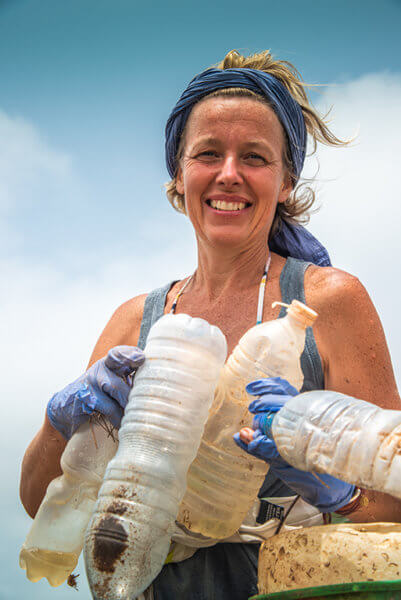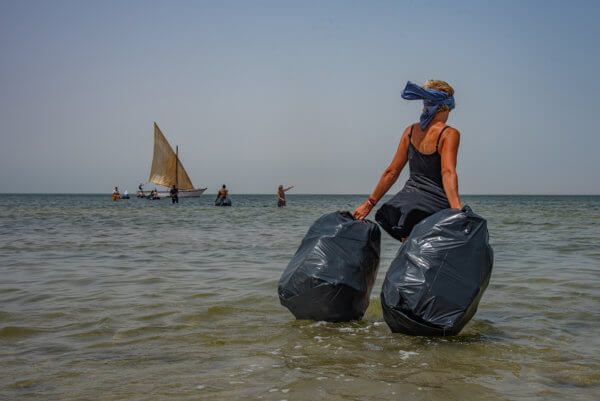Whenever possible, we are committed to taking action directly on the spot. In August 2019, Alicia Heiniger, the founder of Equestrio Foundation, and Charlotte Viet, our Director of Development, flew to Mauritania for a volunteer mission organized by the association Fortune de Mer and dedicated, among other things, to collecting plastic waste in the Banc d’Arguin National Park. An ecological action, certainly, but also an exploratory mission that we considered as essential to envisage potential future commitments. Throwback on a trip full of emotions (and stiff muscles!).
The Banc d’Arguin National Park: wonder or waste?
You may not know (or at least not yet!) the Banc d’Arguin National Park (PNBA). Located in the west of Mauritania, this park of exceptional beauty is also a precious biodiversity reserve. A protected area and UNESCO World Heritage Site since 1989, it is home to many species of breeding birds and migratory waders.
And yet…there, as in many places across the world, flamingos, spoonbills, and terns live with their feet embedded in plastic.
Fighting against plastic pollution
We’ve witnessed this first hand and we can confirm: it is impossible to stay indifferent to such heresy. So, in 2019, Fortune de Mer, therefore, organized a pilot mission to collect waste along the beaches and across the islands and villages in collaboration with the PNBA team. The goal: to collect plastic waste, measure the extent of pollution and thus assess the feasibility of future operations.
At Equestrio Foundation, we decided to see and experience all of this for ourselves in order to also determine our potential contribution to a larger-scope project.
Collecting, collecting and…collecting
For 7 days…from beaches to islands and villages…in 4-wheel drives, in lanches (fisherman’s sailing boats), by foot and even by swimming…full of stamina and sometimes pretty exhausted (or, let’s be honest, totally sick!)…Alicia and Charlotte worked relentlessly alongside the volunteers of Fortune de Mer and the employees of the PNBA to clean up this natural area, entrapped in its paradox – out of time and victim of the wave of current challenges.
Results of the week? 1,435 hours of collection, 17.5 km of coastline cleaned, and 10 tons of all kinds of pollutants, of which 50% plastic and 20% leftovers of marine exploitation (fishing nets, batteries, clothing, metal). These 7 days have also been a clear eye-opener on the extent of the work that needs to be done, as Charlotte puts it: “Seeing these areas become clean as we go along was very gratifying. Yet we sometimes also felt pretty overwhelmed by a feeling of helplessness…each time we thought we were almost done, we would actually look up and see a whole new area, brimming with plastic waste.”


Better insights for better action
This week has also contributed strongly to providing us with a better understanding of the challenges, constraints, and limitations inherent in taking the project to the next level.
The need to generate local commitment
First of all, the concrete and authentic involvement of local institutional stakeholders and an active awareness of villagers about the importance of waste management are critical to the success of a more ambitious project. We realized that this awareness is uneven from one place to the other. But when it’s there, it turns out to be a veritable source of human energy that boosts confidence in the realm of possibilities.
Rigour as the key to the success of operations
This on-field experience also allowed us to assess concrete details for the feasibility of this type of initiative. Among others, the need to not let the plastic waste settle so that it does not become too challenging to remove. This implies carrying out actions quickly, but also and above encouraging the regularity of the collections by giving the local populations the necessary means in terms of human resources, transport, containers, infrastructures, and waste management channels.

So what’s the final verdict?
Are we taking this project further? It’s a yes! We are delighted to inform you that Equestrio Foundation has decided to financially support Fortune de Mer to help restore the beautiful wilderness of this region. On the agenda: the financing of collection operations and goby fishes.
Collecting the waste…
This pilot mission has confirmed the feasibility of collection campaigns on a larger scale. They will take the form of solidarity missions carried out by volunteers during school vacations. So, of course, it has to be said that this will not be wrapped up in a few months’ time, but on the scale of the future of our planet, it’s well within limits! It has indeed been evaluated that it should take 5 years to clean the whole coast of the PNBA, that is to say, 30 missions like the one we went on.
…and setting up goby fishes
These missions will also be combined with the installation of goby fishes in the villages of the PNBA. These giant fish/bird-shaped garbage cans, bearing the effigy of the reserve’s various species, will stand there as a reminder to the villagers and tourists of the importance of protecting the richness of our biodiversity. Created by an artist from Nouakchott, the capital of Mauritania, these precious bins with a true artistic twist have been the cherry on the cake to convince us to take on this project.
You want further details on this project? Hold on for just a few weeks. But should your curiosity get the better of you, don’t hesitate to judge on the spot by taking part in a collection operation… The next holiday* is just round the corner, right?
